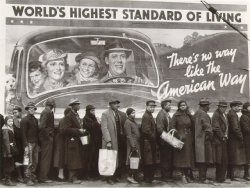The Political Origin of the Phrase, 'We're All in it Together'
The phrase jumped out at me when I first heard them using it, not because it's the title of a recent High School Musical song, but because it appears so often in the Terry Gilliam film, Brazil. I was pretty sure it had an older, more directly political origin, though, so I did a little research - more on that later.
If you haven't seen Brazil (and it's a great film in my opinion), here's a brief description. The film is set in a nightmarish future (or alternative reality - the technology is futuristic, yet retro - a sort of steam-punk meets 1940's film noir) in which life is controlled by an over-bearingly bureaucratic government, though it also seems to be a police state (suspected terrorists are tortured) with shades of rampant capitalism (torture victims must finance their own interrogation and extended interrogation risks the prisoner's credit rating).

Propaganda posters are frequently seen in the background of the film, and on at least two occasions the slogan "we're all it together" can be seen (see still from the movie, above). The phrase is given a different slant later, when Tuttle refuses payment for his repair work - "we're all in it together, kid". It's given yet another angle later when he deals with two Central Services plumbers who are wrecking Sam's apartment, but I won't say more than that in case I spoil the pun for those who haven't seen the film.
Given the film's dystopian theme, it seemed like an odd catchphrase to link a political party to. On the other hand, someone obviously had an odd sense of humour when they named a UK family of military satellites, 'Skynet'. Looking at Cameron's frequent themes of cutting through bureaucracy and handing control back to citizens (see the 2005 speech for an early example), I don't think it would be wild speculation to guess that the Coalition would probably rather see themselves as more like Tuttle than Central Services.
Returning to the earlier origins of the phrase in politics, my feeling was that it originated from World War II, probably Churchill, but I haven't been able to find any evidence of that.
According to this archive of Brazil Usenet posts, the origin of the Brazil poster (see above) is propaganda posters displayed in the US during the Great Depression. I haven't found any evidence of the slogan being used, but I did find this visually similar poster:

"It's time for a new beginning, for an end to government of the few, by the few and for the few, time to reject the idea of an 'on your own' society and to replace it with shared responsibility for shared prosperity. I prefer a 'we're all in it together' society."
It has also been used by Barack Obama:
"Yes, our greatness as a nation has depended on individual initiative, on a belief in the free market. But it has also depended on our sense of mutual regard for each other, of mutual responsibility. The idea that everybody has a stake in the country, that we're all in it together and everybody's got a shot at opportunity. Americans know this. We know that government can't solve all our problems - and we don't want it to. But we also know that there are some things we can't do on our own. We know that there are some things we can do better together."
Before that, it was heard in 1995 from Jerry Brown, the current Democratic candidate for California.
Finally, the earliest political usage I can find is from Richard Nixon, speaking during the Vietnam war in 1972:
"We are all in it together. This is a war. We take a few shots and it will be over. We will give them a few shots and it will be over."



